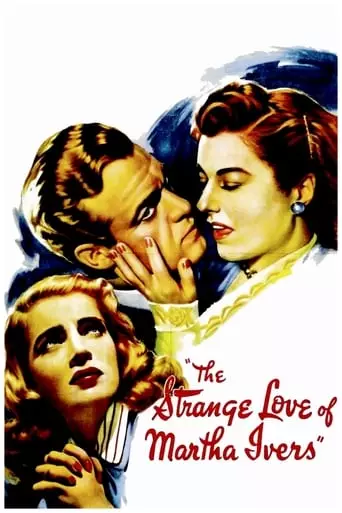
Three childhood friends, Martha, Walter and Sam, share a terrible secret. Over time, the ambitious Martha and the pusillanimous Walter have married. She is a cold businesswoman; he is the district attorney: a perfect combination to dominate the corrupt city of Iverstown at will. But the unexpected return of Sam, after years of absence, deeply disturbs the life of the odd couple.
The Strange Love of Martha Ivers is a 1946 film noir directed by Lewis Milestone, featuring a stellar cast including Barbara Stanwyck, Van Heflin, and introducing Kirk Douglas in his film debut. The narrative unfolds in the fictional town of Iverstown, Pennsylvania, and spans several decades, delving into themes of ambition, guilt, and the inescapable past.
The story begins in 1928 with young Martha Ivers attempting to escape her domineering aunt, Mrs. Ivers. Her plan is thwarted, leading to a tragic accident where Martha inadvertently causes her aunt’s death. To conceal the crime, Martha and her childhood friend, Sam Masterson, fabricate a story implicating an intruder. This deception sets the stage for a complex web of lies and moral compromises that persist into their adult lives.
Seventeen years later, Martha has married Walter O’Neil Jr., the son of the local district attorney, and has become a powerful figure in Iverstown’s milling industry. Sam returns to town, now a soldier and itinerant gambler, and becomes entangled in the lives of Martha and Walter. As the narrative progresses, long-buried secrets resurface, leading to a tragic and inevitable conclusion.
The film explores how the pursuit of power and wealth can lead individuals to moral decay. Martha’s ambition drives her to commit murder and manipulate those around her, illustrating the lengths to which she will go to maintain control. This theme is central to the narrative, highlighting the destructive nature of unchecked ambition.
The Strange Love of Martha Ivers delves into the idea that past actions have lasting consequences. Martha’s initial crime and the lies she constructs to cover it up haunt her throughout her life, affecting her relationships and decisions. The film suggests that one cannot escape the repercussions of their past, no matter how hard they try.
The characters in the film are complex and multifaceted, embodying the moral ambiguities characteristic of film noir. Martha, Sam, and Walter are neither wholly good nor evil; their actions are driven by a mix of desire, fear, and circumstance. This complexity invites viewers to question the nature of morality and the factors that influence human behavior.
The film illustrates how secrets can erode relationships and lead to self-destruction. Martha’s concealed crime and the lies she tells to protect herself create a foundation of distrust and betrayal. The narrative demonstrates that secrets, when kept at the expense of truth, can ultimately lead to tragedy.
Upon its release, The Strange Love of Martha Ivers was praised for its compelling narrative and strong performances, particularly by Barbara Stanwyck and the debuting Kirk Douglas. The film is considered a classic example of film noir, blending elements of melodrama with the stylistic and thematic conventions of the genre. Its exploration of moral complexity and the human psyche has influenced subsequent films in the noir genre and beyond. Critics have lauded its atmospheric direction and the depth of its characterizations, noting its enduring relevance in cinematic history.
After watching The Strange Love of Martha Ivers, you will likely feel a mixture of tension, intrigue, and reflection. The film’s noir atmosphere, combined with its morally complex characters, will leave you contemplating the themes of guilt, ambition, and the consequences of one’s past actions. The film’s tragic ending, built upon the web of lies and secrets, will evoke a sense of sadness and inevitability, making you think about the human cost of deception and unchecked ambition. You may also feel a deep respect for the performances, particularly Barbara Stanwyck’s portrayal of the conflicted Martha, whose inner turmoil is palpable throughout the film. The character’s journey will likely resonate with you, as it highlights the emotional weight of living with guilt and the destructive power of secrets.
Moreover, the film’s exploration of moral ambiguity will leave you questioning the choices made by the characters, prompting reflection on how far individuals are willing to go for power, love, and self-preservation. The sense of moral conflict and the impact of past actions will linger in your mind long after the credits roll. Ultimately, The Strange Love of Martha Ivers is a thought-provoking film that challenges you to confront uncomfortable truths about human nature, making it a memorable experience that stays with you. It’s a reminder of the complexity of relationships, the weight of secrets, and the inescapability of the past.
